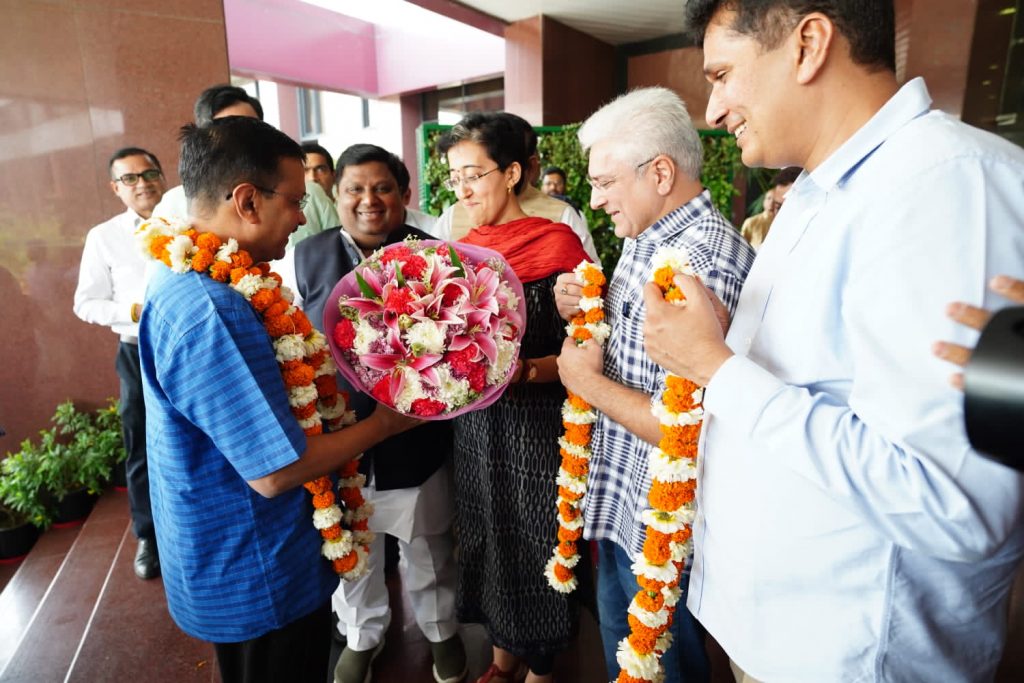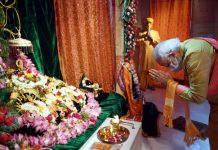
The Apex Court ruling comes as a major relief to AAP, which has been engaged in a war of attrition with Lt Guv VK Saxena over sharing of power in the national capital. The judgement may also end tussle between the Delhi government and the Centre, writes Mudit Mathur
Disagreeing with Justice Ashok Bhushan’s view in the 2019 split verdict, where he said that “services” were totally outside the purview of Delhi Government, the Constitution Bench of Supreme Court unanimously held that Delhi government has control over administrative services in the National Capital, excluding matters relating to public order, police and land.
A Constitution Bench comprising Chief Justice DY Chandrachud, Justice MR Shah, Justice Krishna Murari, Justice Hima Kohli and Justice PS Narasimha said the legislative assembly of NCTD embodies the principle of representative democracy and thus, Article 239AA must be interpreted in a manner to further the interest of representative democracy.
The Bench was of the view that if the officers feel they are insulated from the control of the government, it will dilute accountability and affect governance. “If a democratically elected government is not given the power to control the officers, the principle of triple chain of accountability will be redundant. If the officers stop reporting to the Ministers or do not abide by their directions, the principle of collective responsibility is affected,” the Bench observed.
Article 239AA of the Constitution of India granted Special Status to Delhi among Union Territories (UTs) in the year 1991 through 69th constitutional amendment by Parliament, thereby providing the Legislative Assembly and a Council of Ministers responsible to such Assembly with appropriate powers to deal with matters of concerns to common man.
Article 239AA provides – Public Order, Police & Land in NCT of Delhi fall within the domain and control of the Central Government which shall have the power to make laws on these matters. For remaining matters of State List or Concurrent List, in so far as any such matter is applicable to UTs, the Legislative Assembly shall have power to make laws for NCT of Delhi.
The bench also highlighted that Article 239AA is meant to balance the interests between Delhi government and Union of India. “The executive power of Union in a state over matters on which both union and states can legislate is limited to ensure that governance of state is not taken over by the union. This would completely abrogate the federal system of governance and the principle of representative democracy.”
“Thus, in any federal Constitution, at a minimum, there is a dual polity, that is, two sets of government operate: one at the level of the national government and the second at the level of the regional federal units. These dual sets of government, elected by ‘We the People’ in two separate electoral processes, are a dual manifestation of the public will. The priorities of these two sets of governments which manifest in a federal system are not just bound to be different but are intended to be different.”
The bench noted that the architects of our Constitution consciously chose to limit the executive authority of the central government in states in the interest of federalism. Chief Justice Chandrachud, who authored the judgement on behalf of his colleagues, wrote:
“The executive power of the union ‘in a state’ over matters on which both states and the Union of India can legislate (that is, the concurrent list) is limited to ensure that the governance of states is not taken over by the Union. This would completely abrogate the federal system of governance and the principle of representative democracy. It is with this objective in mind that the members of the Constituent Assembly thought it fit to limit the executive power of the Union in a state over matters on which the state also has legislative competence. In the spirit of cooperative federalism, the Union of India must exercise its powers within the boundaries created by the Constitution.”
However, the Constitution bench made it clear that legislative structure of Article 239AA excludes specified entries from the power of the legislative assembly of GNCTD, i.e. Entries 1, 2 and 18 of List II to Schedule VII (public order, police and land).
The bench responded by saying, “A constitutionally entrenched and democratically elected government needs to have control over its administration,” while adding, “In a democratic form of government, the real power of administration must reside in the elected arm of the State, subject to the confines of the Constitution.”“An unaccountable and non-responsive civil service may pose a serious problem of governance in a democracy,” it added.
This decision comes as a major relief to Delhi’s ruling Aam Aadmi Party (AAP), which has been engaged in a war of attrition with Lieutenant Governor VK Saxena over the division of authority and sharing of power in the national capital. The judgement is expected to settle ongoing faceoff between the Delhi government and the union government over control of administrative services in the National Capital Territory of Delhi.
In February 2019, two Judges of the Supreme Court had expressed divergent views, pursuant to which, the matter was directed to be placed before a three-judge bench for resolution. Justice AK Sikri held that transfers and posting of officers of and above the rank of Joint Secretary were under the powers of Lieutenant General of Delhi; other officers were under the control of Delhi Govt. Justice Ashok Bhushan dissented to hold that “services” were totally outside the purview of Delhi Government.
In 2022, the then Chief Justice of India, NV Ramana constituted a three-judge bench to decide upon the dispute. Later, the three-judge bench referred to a Constitution Bench limited questions pertaining to the legal dispute.
Senior Advocate Dr Abhishek Manu Singhvi led the arguments for the GNCTD. Solicitor General of India Tushar Mehta appeared for the Central Government.
The AAP hailed the Supreme Court’s verdict on the Centre-Delhi services with party chief Arvind Kejriwal terming the verdict a “victory of democracy.” Subsequent to the top court verdict, Kejriwal will go to the Delhi Secretariat for the first time in many months and hold a meeting with his cabinet, officials said.
“The elected government will have the power of transfer-posting of officers. Officers will work only through the elected government. The Lt Governor will have no power over the officers to stop the work of the people of Delhi,” the party said.













